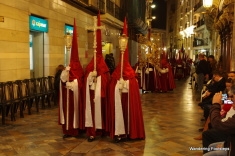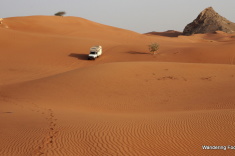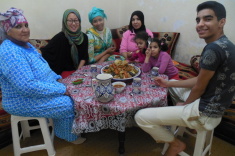I’m sick. This hot, arid weather is kicking my ass. Last Friday (6 whole days ago) I started to feel like I was fighting a cold. Ok, fine – except for the fact that I had planned, the next morning, on going to this new gym in Windhoek to take a few aerobics classes. Stubborn as I am, I went anyway. I bike rode 20 minutes there, took a zumba class, then a yoga class, then a hip hop class, and then biked 20 minutes home in the heat.
I should have known something was not normal. I was seeing stars from the very beginning of zumba class and I was having trouble following the teacher and dancing with my usual coordination. By Saturday evening, I had developed a horrible headache, sore throat and upset stomach. The next day, the stomach pain and sore throat were gone, but in their place was a sense dizziness and weakness I’ve never felt before, combined with an awful sinus headache. These symptoms have continued up until now.
After doing some research, it would seem that I have sinusitis and heat exhaustion, both caused by this Namibian desert climate. The dry, dusty air has dried out my sinuses, preventing the regular flow of mucus and causing such excruciating pain it feels like my head wants to explode. And the 40 degree heat has raised my body temperature ever so slightly, making me feel weak and faint and generally exhausted (hence the name heat exhaustion).
Needless to say, my Windhoek exploration has been limited. I had plans to visit the cultural center, the theater, the dam, the walking path, etc etc etc. I wanted to give the city another chance after my off-putting first impression, to see its beauty and charm and to learn about what makes this place tick. But right now, all I feel like doing is lying down and watching mindless television.
I have managed to see parts of the city, mainly as a result of the errands Bruno and I have been running in and around town. I also forced myself to do a half-day trip into the city on Tuesday to visit the national museum, the most famous church, and a park, but I was certainly not on top form. The following Windhoek comments are being written as I sit at my campsite weakly sipping on a homemade rehydration beverage (water, sea salt, lemon, and raw honey) after having stuck my head under a towel breathing in warm steam for twenty minutes. If the comments seem confused or random, you’ll know why:
 The first thing that struck me upon entering Windhoek was its natural beauty. Surrounded by arid, scraggly hills on all sides, this valley can be mistaken for no other city I know. Even now, the hills continue to provide an alluring backdrop to almost any view of the city, as well as affording one the possibility of viewing the city from above.
The first thing that struck me upon entering Windhoek was its natural beauty. Surrounded by arid, scraggly hills on all sides, this valley can be mistaken for no other city I know. Even now, the hills continue to provide an alluring backdrop to almost any view of the city, as well as affording one the possibility of viewing the city from above.Windhoek has other sources of charm as well. As springtime arrives, colors abound. More than Canada in the springtime, Southern Africa’s plants are bright and full of life –pink bougainvillea, purple jacarandas, and other flowering trees in oranges, yellows, and whites. It’s gorgeous to pass through the parks and residential areas and see these flowers in full bloom. Add to this the fact that Windhoek has a provincial feel rather than the typical capital city chaos, and it’s easy to see the charm to this place.
 But perhaps Windhoek’s greatest charm is its unique infusion of German and African culture. I’ve now seen a few African cities which have clear Dutch or English influence, but never have I been to an African city whose colonial heritage was German. Even though the Germans were only in Namibia for 30 years, their strong cultural legacy is firmly rooted in Windhoek. German delicatessens abound. Street signs often end with the word “strasse” (German for “street”) – there is even an entire section of streets in the west with names like “Beethoven strasse”, “Bach strasse” and Wagner strasse”! People keep speaking German to me. And German-styled architecture is everywhere, from the three castles in the south east of the city to the infamous Christuskirche (church), an iconic Windhoek symbol. In some parts of the city, you feel that you could be in Germany. But then you turn the corner and are reminded you are in Africa. The black faces, the taxis tooting at you, the street vendors selling curios or African tourist kitsch. The women wearing traditional bright African-patterned clothing. The dirt, the dust, the African sun.
But perhaps Windhoek’s greatest charm is its unique infusion of German and African culture. I’ve now seen a few African cities which have clear Dutch or English influence, but never have I been to an African city whose colonial heritage was German. Even though the Germans were only in Namibia for 30 years, their strong cultural legacy is firmly rooted in Windhoek. German delicatessens abound. Street signs often end with the word “strasse” (German for “street”) – there is even an entire section of streets in the west with names like “Beethoven strasse”, “Bach strasse” and Wagner strasse”! People keep speaking German to me. And German-styled architecture is everywhere, from the three castles in the south east of the city to the infamous Christuskirche (church), an iconic Windhoek symbol. In some parts of the city, you feel that you could be in Germany. But then you turn the corner and are reminded you are in Africa. The black faces, the taxis tooting at you, the street vendors selling curios or African tourist kitsch. The women wearing traditional bright African-patterned clothing. The dirt, the dust, the African sun. Which brings me back to my sickness. I wish I were able to write more about Windhoek. That I were able to talk about exciting experiences I had here or interesting local people I met who led me to understand more about their home. But my illness left me paralyzed and unmotivated. What I saw – and was therefore able to write about – were hazy impressions, viewed from the window of a vehicle or my own two sluggish feet.


